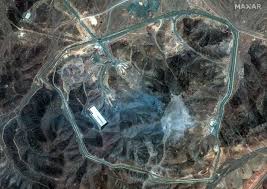Just when the world hoped for a pause in the Middle East’s tensions, the aftermath of a shaky ceasefire has thrown everything back into chaos.
In a defiant televised speech on June 26, 2025, Iran’s Supreme Leader Ayatollah Ali Khamenei made it clear that recent US and Israeli strikes did little to weaken the country’s resolve—or its nuclear ambitions.
Khamenei Dismisses US Strikes as Ineffective
Speaking for the first time since the fragile ceasefire, Khamenei shrugged off claims that US airstrikes damaged Iran’s nuclear sites.
In fact, he directly accused former US President Donald Trump of exaggerating the impact of strikes on critical facilities in Fordow, Natanz, and Isfahan.
Khamenei didn’t hold back, describing Iran’s own missile response to a US base in Qatar as a “slap to America’s face.”
He then issued a stern warning: if provoked again by either the US or Israel, Iran would retaliate with force.
Israel’s Failed Assassination Attempt
Adding fuel to the fire, Israeli Defense Minister Israel Katz confirmed rumors that Israel had targeted Khamenei for assassination during the recent 12-day conflict.
According to Katz, the Iranian leader managed to survive by going underground and cutting off communications.
Though Khamenei escaped, the fallout was deadly.
On June 13, Israel launched strikes that reportedly killed senior Iranian commanders and nuclear scientists.
Katz insisted that the mission was a unilateral Israeli decision, carried out without needing a green light from the US.
Trump Defends Military Strikes, Downplays Iranian Retaliation
Donald Trump, no longer president but still very much a vocal political force, stood by the US airstrikes.
He claimed that the attacks “completely obliterated” key nuclear facilities using precision-guided cruise missiles and powerful bunker-busters.
He dismissed Iran’s response as weak and insisted the strikes had destroyed important equipment, including centrifuges and underground enrichment sites.
However, multiple intelligence sources and IAEA (International Atomic Energy Agency) analysts contradicted that claim, suggesting the damage was mostly minimal and would only delay Iran’s nuclear program by a few months—not years.
Iran Cuts Off IAEA, Tensions With West Rise
In response to the strikes, Iran announced a major shift: it would suspend cooperation with the IAEA.
Foreign Minister Araghchi accused the agency of staying silent in the face of what he called US-Israeli aggression on sovereign nuclear sites.
The decision drew concern across Europe. Germany, in particular, urged Iran not to abandon the Nuclear Non-Proliferation Treaty (NPT).
Meanwhile, Iran’s parliament passed new legislation that could further distance the country from international nuclear oversight.
A Fragile Peace Hangs in the Balance
With threats, missile strikes, and diplomatic breakdowns dominating the headlines, it’s becoming harder to imagine a path back to peace.
The world now watches nervously to see if cooler heads will prevail—or if the next chapter in this high-stakes standoff is already being written.
